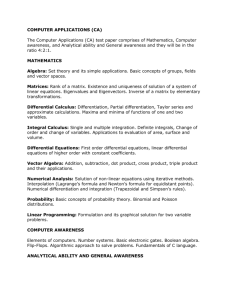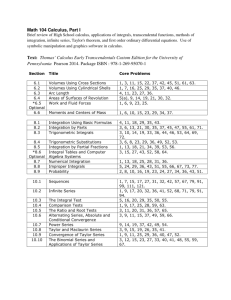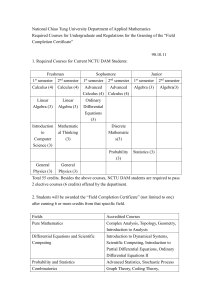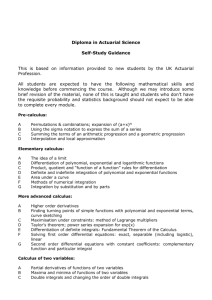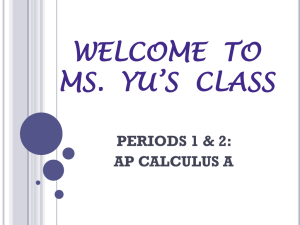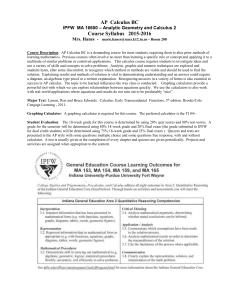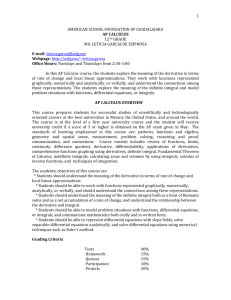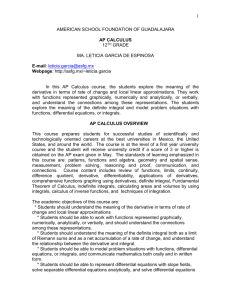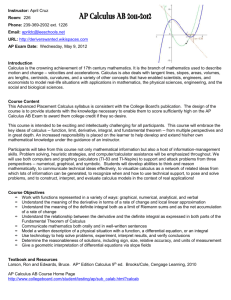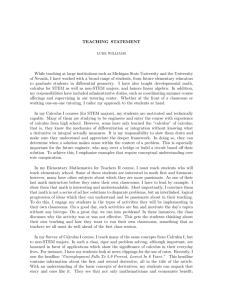MATH 280 - Ocean County College
advertisement
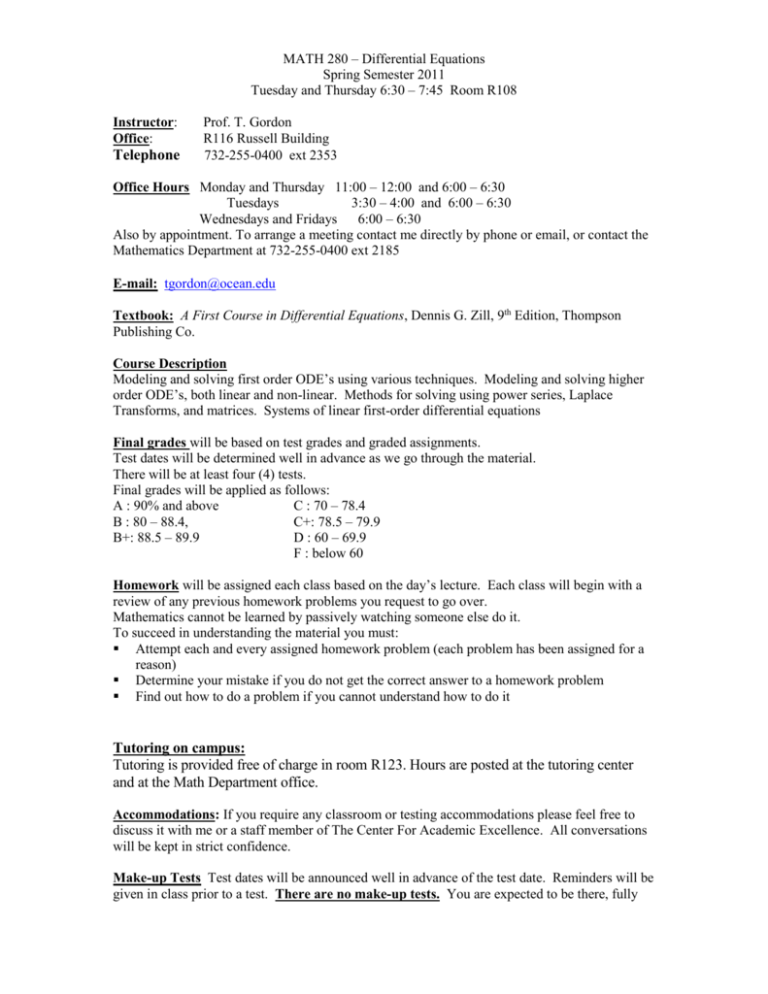
MATH 280 – Differential Equations Spring Semester 2011 Tuesday and Thursday 6:30 – 7:45 Room R108 Instructor: Office: Telephone Prof. T. Gordon R116 Russell Building 732-255-0400 ext 2353 Office Hours Monday and Thursday 11:00 – 12:00 and 6:00 – 6:30 Tuesdays 3:30 – 4:00 and 6:00 – 6:30 Wednesdays and Fridays 6:00 – 6:30 Also by appointment. To arrange a meeting contact me directly by phone or email, or contact the Mathematics Department at 732-255-0400 ext 2185 E-mail: tgordon@ocean.edu Textbook: A First Course in Differential Equations, Dennis G. Zill, 9th Edition, Thompson Publishing Co. Course Description Modeling and solving first order ODE’s using various techniques. Modeling and solving higher order ODE’s, both linear and non-linear. Methods for solving using power series, Laplace Transforms, and matrices. Systems of linear first-order differential equations Final grades will be based on test grades and graded assignments. Test dates will be determined well in advance as we go through the material. There will be at least four (4) tests. Final grades will be applied as follows: A : 90% and above C : 70 – 78.4 B : 80 – 88.4, C+: 78.5 – 79.9 B+: 88.5 – 89.9 D : 60 – 69.9 F : below 60 Homework will be assigned each class based on the day’s lecture. Each class will begin with a review of any previous homework problems you request to go over. Mathematics cannot be learned by passively watching someone else do it. To succeed in understanding the material you must: Attempt each and every assigned homework problem (each problem has been assigned for a reason) Determine your mistake if you do not get the correct answer to a homework problem Find out how to do a problem if you cannot understand how to do it Tutoring on campus: Tutoring is provided free of charge in room R123. Hours are posted at the tutoring center and at the Math Department office. Accommodations: If you require any classroom or testing accommodations please feel free to discuss it with me or a staff member of The Center For Academic Excellence. All conversations will be kept in strict confidence. Make-up Tests Test dates will be announced well in advance of the test date. Reminders will be given in class prior to a test. There are no make-up tests. You are expected to be there, fully prepared. In the event a serious situation arises that precludes your attendance the day of a test you, or someone on your behalf, must contact me prior to the test. In the extremely unlikely case of missing a test without being able to contact me due an extremely serious event the day of the test, you, or someone on your behalf, must contact me within 24 hours after the test. Be prepared to document the event that caused your absence. Attendance Four (4) absences without contacting me may be assumed to be a drop and you may be withdrawn from the class. A sign-in sheet will be passed around during each class for you to sign. Attendance will be tracked, but will not be a direct factor in the determination of final grades. Withdrawals: A grade of “W” will be given according to school policy. OCC POLICY: AFTER 5PM APRIL 4th WITHDRAWALS WILL NOT BE ALLOWED Cheating/Plagiarism: Cheating in any of its many forms is an unacceptable behavior. It is disrespectful to those students who strive to meet challenges and expand their intellectual horizons. It is an insult to the fundamental integrity of education and spirit of learning. I will take any action necessary to protect my students from this type of behavior. You may wish to refer to Ocean County College Policy #5180 on plagiarism in the student handbook. Proper Classroom Behavior: 1. 2. 3. 4. Please turn off all cell phones, beepers, pagers, or any other devices, which could disrupt the class. Please treat other students in the class with respect and consideration. I encourage every student to participate in class discussions and expect them to be treated properly. At no time will I allow any student to be treated disrespectfully. However, if you should catch me in an arithmetic mistake – feel free to embarrass me fully. Please arrive for class on time. A late arrival tends to disrupt the class and distract all of us. If you do arrive late for a class please refrain from making a dramatic entrance. If you have a personal need to be dramatic upon entering then you might want to consider becoming a theatre major. Please avoid private conversations during the class period since this is distracting and disturbing to other students. If you have a question about a lecture point please ask. Chances are if you have a question somebody else is probably wondering as well: we all benefit from questions. Disclaimer Reasonable changes to this course information sheet may be made exclusive of course requirements, course calendar and grading procedures. All individuals should not assume that anything received, sent, or stored in this course or in any course is private. Students’ written work, assignments, and test results may be used anonymously for college assessment purposes. Course content, support materials, and communications (including chats, discussions, emails, and any other forms of communication) may be used for quality assurance purposes by authorized college administrators Please note: Failure to pay for this course may result in your being dropped for non-payment. If you have any questions on these procedures or if at any time you find some aspect of the class to be distracting or disturbing to you, please see me individually as soon as possible. All of your concerns will be kept confidential. Tentative Semester Outline General overview of differential equations Section 1.1 Formal vocabulary and definitions Section 1.2 Section 2.1: Slope Fields Section 2.2 Section 2.3 Review and practice of partial differentiation and partial integration (from Calculus III ) Section 2.4 Section 2.5 Chapter 4: Selected topics Review of Series: Taylor and MacLaurin, Power Series, Intervals of Convergence, Differentiation and Integration of Infinite Series (You should have seen these in Calculus II) Chapter 6: selected topics Sections 7.1 and 7.2 Section 7.5 Selected topics from Chapter 8 Sections 9.1 and 9.2 We will also do some modeling throughout the semester. We will see how differential equations arise out of observations of the physical world, and how they can be used to both explain and predict physical phenomena. Here is a partial list of skills you are expected to already know . And when I say “KNOW” I mean that you actually understand it very, very well. From Calculus I Interpretation of a derivative as the slope of a tangent line Finding derivatives, both implicitly and explicitly From Calculus II Techniques of Integration: U-Substitution, By-Parts, Partial Fractions, Trig-Sub, etc. Power Series Improper Integrals: such as b a a f ( x)dx blim f ( x)dx From Calculus III Partial differentiation and partial integration Finding determinants of 3 X 3 matrices (in Calculus III this is called a “cross-product”) NOTE: I always assume that no one has taken Calculus III. I will teach these two concepts from scratch

